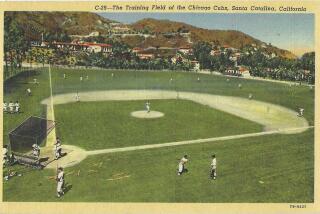Baseball’s home-field advantage is not a big one
- Share via
When the National League defeated the American League, 5-1, in baseball’s All-Star game last week, the NL won home-field advantage for its representative in the World Series. But is home-field advantage actually worth anything?
Commissioner Bud Selig insisted that the All-Star game determine home-field advantage in the World Series after the game ended in a tie in 2002. The AL won seven All-Star games in a row beginning in 2003 but won the World Series only four times. Players value the comforts of home in October, but they don’t see the logic in awarding home-field advantage to the winner of an exhibition game.
“Any team would love to have home-field advantage in the World Series,” Michael Young, a Texas Rangers infielder, said before the All-Star game. The All-Star game rule “is a little tough to explain. I think there are other ways to do it.”
Young’s experience last year, when his Rangers lost the World Series to the San Francisco Giants in five games, certainly gives him reason to argue that the home team has a distinct advantage. The numbers say the home team does have an advantage, though it is not as distinct as Young might think.
There have been 84 World Series played since 1924 using the 2-3-2 format in which the team with home-field advantage hosts the first two and last two games, and the home team has won 48 times, or 57%. (Excluded are years in which the travel format was altered because of war and 1994, when there was no World Series because of a strike.) From 1951 to 1980, the team without home-field advantage won 20 of the 30 Series, while 22 of the last 29 winners have been the team with home-field advantage.
“Baseball in general has the lowest home-field advantage of all sports,” said Tobias Moskowitz, coauthor of “Scorecasting” and a professor at the University of Chicago. “We don’t find that there is any difference in the postseason versus the regular season, once you adjust for the quality of teams.”
Even though baseball is the one sport where the dimensions of the field vary in each ballpark, allowing teams to mold their rosters to the idiosyncrasies of their home stadiums, it is also the sport with the lowest historical home-team winning percentage. Over the last three complete seasons, the home team has won 55.5% of the 7,288 games. Over the last century, that figure has hovered around 54%.
Basketball, where the court is a universal size, maintains the highest home-team winning percentage. Over the last three seasons, NBA home teams have won 60.2% of their games. The next-highest rate in the four major sports comes from the NFL, at 56.7%. So what determines home-field advantage?
“When you look at the data, [referees are] the thing that come at you most and are the primary contributor,” Moskowitz said. “Referees are human beings. As human beings, we are affected by larger groups.”
Former NBA referee Tim Donaghy altered the scores of games without detection because he faced an abundance of judgment calls in every game. From traveling violations to borderline foul calls, a ref influences every play, sometimes simply by not making a call.
A referee’s tendencies in a basketball game hold far more influence than an umpire’s do in a baseball game. With more opportunities for error come more errors, and these errors generally favor the home team thanks to the home fan base.
“We have the desire to please the people around us,” Moskowitz said. “If you can make a call that 50,000 people will agree with or make the call that causes them to say unprintable, nasty phrases at you, it is natural to want to alleviate some of that pressure, consciously or subconsciously.”
Thanks to this subconscious submission to peer pressure, home-court advantage is crucial in the NBA Finals, but it holds a only minimal effect in the World Series. Nonetheless, deciding who gains the advantage through the All-Star game doesn’t sit well with Moskowitz, even as he diminishes the importance.
“I have always thought that was a crazy way to allocate the home-field advantage, using the All-Star game, but that’s another issue,” he said.
twitter.com/d_farmer
More to Read
Go beyond the scoreboard
Get the latest on L.A.'s teams in the daily Sports Report newsletter.
You may occasionally receive promotional content from the Los Angeles Times.










